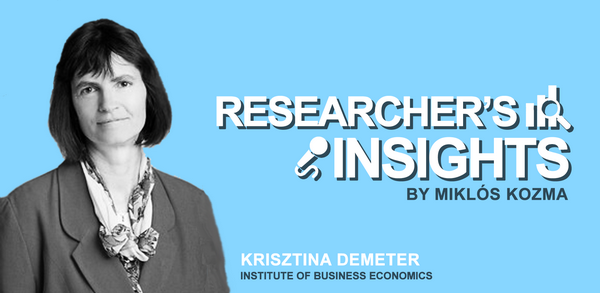Will big will be even bigger? Digitalization and its consequences Researcher’s insights: Krisztina Demeter

I interviewed Krisztina Demeter professor of the Institute of Business Economics about the role of manufacturing strategies in digitalization. We know that manufacturing in its current form and way of functioning does not have a bright future, the replacement of existing practices owing to digitalization is only a question of time.
Why does a company need a manufacturing strategy?
The management of a company might be aware of the necessity of digitalization and may introduce systems relying on new technologies, the success of the company, however, cannot be maintained without knowing what the new system is used for and how it is used. The way in which the company takes a new direction requires conscious decisions. One objective might be substituting workforce, i.e. to substitute the work of employees performing repetitive tasks with technological solutions. Another direction might be to increase the reliability of manufacturing through digitalization by eliminating human errors and lowering costs. The professor mentioned a particular case when one of the operators of General Electric noticed that the sound of the machine had changed, it was not as it used to be. When the engineers examined the machine, one of the parts turned out to be worn out. They could intervene before the machine would have broken down. It is good news that as a result of digitalization sensors make sure that worn out parts are only replaced when this becomes really necessary. Companies don’t need to rely on experienced ears anymore and can realize considerable savings.
Digitalization entails „top-heavy” costs
a fact that is often underestimated by company executives. In order to realize the digital transition of manufacturing, basic systems need to be built properly, for instance internet-based connection between the devices must be ensured in a stable way. Each unit must be equipped with a sensor and communication between them should rely on a central database. The recognition of how high the initial investment is can itself justify the rationale for a digital manufacturing strategy.
Will small companies be left out and go out of business?
In Krisztina Demeter’s view it cannot be excluded that the digital transition of the manufacturing systems of large companies that is currently taking place will represent a serious threat for smaller companies. Transition to the so-called additive manufacturing (more widely known as 3D printing) enables large enterprises to manufacture prototypes easily and cheaply and also to deal with small-batch orders in a cost effective manner. The question of how the competitive advantage of small companies in the field of manufacturing can then be maintained is still to be answered.
We live amidst market and technological turbulences
In a survey questionnaire compiled with Tamara Keszey, researcher of the Marketing Institute and János Kiss of the Institute of Business Economics, Krisztina Demeter is examining how far innovation and manufacturing performance can have a positive effect on business performance if we take into account current environmental turbulences. Owing to among others disruptive innovations, market turbulence cause demand trends to become increasingly volatile in a growing number of industrial segments. The problem of technological turbulence, on the other hand, means that corporate decision makers might be confronted with new technological solutions as often as every year, thus forcing them to face the eternal dilemmas of exploitation and discovery. It is not easy to decide, as a matter of fact, if higher business performance should be achieved through the further exploitation of the existing technology and product platform or time has come to try out new technologies, to introduce new products by means of major investments and thereby risk achieving return on previous investment.
Understanding the transformation of supply chains
in the light of the digitalization of manufacturing is in the focus of a major research project funded by EFOP (Human Resource Development Operational Program) involving the professor and many other colleagues at the university. The work is carried out with the contribution of colleagues engaged in different fields and involves major sectors like the retail sector, the FMCGs (Fast Moving Consumer Goods), mechanical engineering, SSCs (Shared Service Centres) and logistics service providers. The research topic addresses major questions out of which the optimization of the workforce of companies, i.e. whether major lay-offs can be avoided in the wake of digitalization is perhaps one of the issues of the widest general interest.
Miklós Kozma
Department of Business Studies
